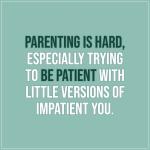It’s nearly here now. Next Sunday, December 23, marks the last Sunday in Advent, that time of waiting and preparation so we are ready to receive the gift of the baby in the manger. Of course, not many of us have taken the time we need to get our hearts fully prepared. I, of course, am one who, though full of good intentions, just didn’t take all the time I had planned so I, too, could be in a state of complete readiness when I come to adore the baby.
On the other hand, it is not all that hard to adore babies. They are amazing little things—innocent and sweet and just a whole lot of trouble with a tendency to disrupt all our normal routines.
I wonder if that is one of the reasons that God chose this truly strange method to break into human experience. God comes as a baby, innocent, and sweet and just extremely disruptive.
I have been pondering recently a generational quirk in my heritage. The women, especially on my paternal side, all tend to have two babies within a year and a half of each other. One time when I was learning something about my family history, I saw that this tendency went back at least four generations. Now my oldest son and his wife have followed the pattern. Their second son, Samuel, was born about five weeks ago, just 17 months after the first, Joshua, made his appearance.
Now, I could have told them that Joshua would not take kindly to Samuel’s birth. Joshua, very much used to having the world ordered to his satisfaction, is a typical demanding, manipulative, charming self-centered toddler. Simply adorable, of course, as all our grandchildren are. But still . . . he has a strong need to be the center of his parents attention. Samuel’s birth has been very disruptive to his little self-centered world. Just as my second son’s appearance was to his older brother’s world, and my sister’s appearance to my own world. Yes, these babies were quite disruptive to our natural tendencies to be self-centered.
As I said, I could have told them this, but why bother? We all have to learn these things for ourselves, and by the time I could have told them that, this new life was well along in his mother’s womb. Personally, my oldest son was such an easy charming baby that I assumed it was all because I was such a wonderful mother, so why not have another? After all, it was clear I was a great gift to the art of mothering! Boy, did my second son upset my over flattering picture of my mothering capabilities! Yes, that disruption again.
So, I’m thinking about the baby we keep singing about in the well-loved Christmas carols like “O come, let us adore him,” and “Away in a Manger” and “O Holy Night.” This music is full of terms of love and gentleness and hope and sweetness and the goodness of God.
But we don’t often sing of the disruption caused by this very strange way of God’s entering human life. Think about it. Mary’s and Joseph’s plans have gone completely awry. Surely their families must have felt much disappointment with the too-soon birth of their grandchild.
Some middle eastern men who lived by studying the stars suddenly leave everything behind for several years in their search to make sense of something in the heavens/ Their searches lead them to a poor family in odd circumstances. The king of Judea, Herod (not a nice man at all), decides he so doesn’t want his life disrupted that he orders the slaughter of a lot of little children to ensure his own claim to the throne. All this is very disruptive to the ways we think God should enter the world of humanity
Then this baby grows up and turns out to be nothing like the kind of Savior that the people want. He favors the poor and the sinner and the outcast and those with no place in polite or ordered society. He castigates the religious and upright people. He dies the death of a criminal, and his body disappears after his death and his followers cause all sorts of chaos with their wild claims of resurrection. Very disruptive indeed. Not at all what is expected.
It does seem that the entrance of holiness into that which is non-holy causes all sorts of disruption. Instead of hearing words like, “I love you so much that you don’t have to change anything,” we hear, “I love you so much that you must undergo deep transformation in order to be able to fully understand it. If you really want to receive this love, your life will never be the same again.” I think most of us would rather hear the first statement than the last. But the last one is a lot closer to the real message of Christmas—and it’s wonderfully disruptive.
So, have a merry Christmas—and let the entrance of the baby throw things off just a bit. You’ll never be sorry you did.
















